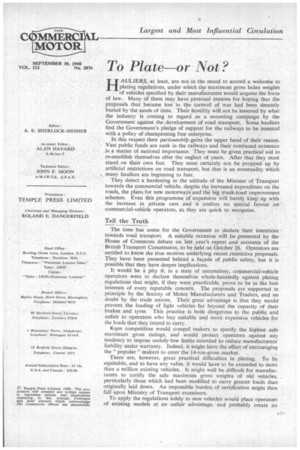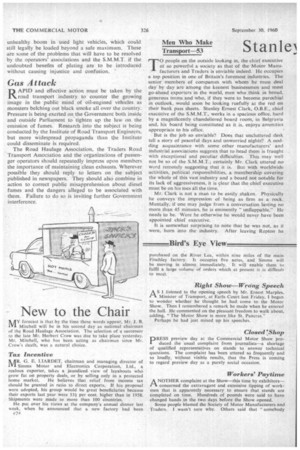To Plate or Not?
Page 59

Page 60

If you've noticed an error in this article please click here to report it so we can fix it.
H.AULIERS, at least, are not in the mood to accord a welcome to plating regulations, under which the maximum gross laden weights of vehicles specified by their manufacturers would acquire the force of law. Many of them may have personal reasons for hoping that the proposals that became lost in the turmoil of war had been decently buried by the sands of time. Their hostility will not be lessened by what the industry is coming to regard as a mounting campaign by the Government against the development of road transport. Some hauliers find the Government's pledge of support for the railways to be inimical with a policy of championing free enterprise.
In this respect their partisanship.gains the upper hand of their reason.
• Vast public funds are sunk in the railways andtheir continued existence is a matter of national importance. They must be given practical aid to re-establish themselves after the neglect of years. After that they must stand on their own feet. They must certainly not be propped up by artificial restrictions on road transport, but that is an eventuality which , many hauliers are beginning to fear.
They detect a hardening in the attitude of the Minister of Transport towards the commercial vehicle, despite the increased expenditure on the roads, the plans for new motorways and the big trunk-road improvement schemes. Even this programme of expansion will barely keep up with the increase in private cars and it confers no special favOur on ' commercial-vehicle operators, as they are quick to recognize.
Tell the Truth The time has come for the Government to declare their intentions towards road transport. A suitable occasion will be..presented by the House of Commons debate on last year's report and accounts of the British Transport Commission, to be held on October 26. Operators are entitled to know the true motives underlying recent sestrictive proposals. They have been presented behind a facade of public safety, but it is possible that they have deeper implications.
It would be a pity if, in a state of uncertainty, commercial-vehicle operators were to declare themselves whole-heartedly against plating regulations that might, if they were practicable, prove to be in the best interests of every reputable concern. The proposals are supported in principle by the Society of Motor Manufacturers and Traders, and no doubt by the trade unions. Their great advantage is that they would prevent the loading of light vehicles far beyond the capacity of their brakes and tyres This practice is both dangerous to the public and unfair to operators who buy suitable and more expensive vehicles for the loads that they intend to carry.
Keen competition would compel makers to specify the highest safe maximum gross ratings, and would protect operators against any tendency to impose unduly-low limits intended to reduce manufacturers' liability under warranty. Indeed, it might have the effect of encouraging the "popular "makers to enter the 14-ton-gross market. .
There are, however, great practical difficulties in plating. To be equitable, and to have any value, it would have to be extended to more than a million existing vehicles. It might well be difficult for manufacturers to certify the safe maximum gross weights of old vehicles, particularly those which had been modified to carry greater loads than originally laid down. An impossible burden of certification might then fall upon Ministry of Transport examiners.
To apply the regulations solely to new vehicles would place operators of existing models at an unfair advantage, and probably create an unhealthy boom in used light vehicles, which could still legally be loaded beyond a safe maximum. These are some of the problems that will have to be resolved by the operators' associations and the S.M.M.T. if the undoubted benefits of plating are to be introduced without causing injustice and confusion.
Gas Attack •
RAHD and effective action must be taken by the road transport industry to counter the growing image in the public mind of oil-engined vehicles as monsters belching out black smoke all over the country. Pressure is being exerted on the Government both inside and outside Parliament to tighten up the law on the emission of fumes. Research into the subject is being conducted by the Institute of Road Transport Engineers, but more widespread propaganda than the Institute could disseminate is required. The Road Haulage Association, the Traders Road Transport Association and the organizations of passenger operators should repeatedly impress upon members the importance of maintaining clean exhausts. Wherever possible they should reply to letters on the subject published in newspapers. They should als6 combine in action to correct public misapprehension about diesel fumes and the dangers alleged to be associated with them. Failure to do so is inviting further Government interference.
























































































































































































